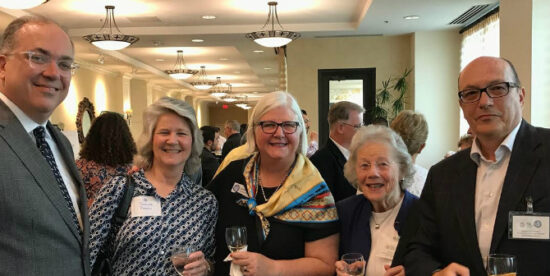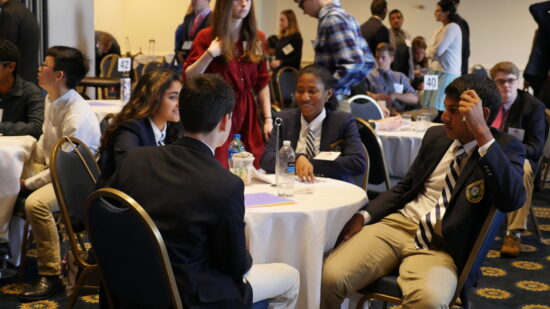
Bill Clifford (left) with WACA leaders at the Spring Leadership Meeting in Texas, hosted by the World Affairs Council of San Antonio this past May. Photo credit: World Affairs Council of San Antonio.
With more than 90 organizations across the country, the World Affairs Councils of America (WACA) is a network of nonprofit organizations working to expand public discourse on international affairs and related topics. We spoke with Bill Clifford, President and CEO, about U.S. public diplomacy, global leadership, and his vision for WACA.
What are some of your ideas for how our organizations can collaborate better together?
With more than two dozen member organizations in common, WACA and Global Ties U.S. share good “genes.” Our respective national meetings would be a good stage for diving deeper on this question.
I would like to see World Affairs Councils not part of the Global Ties Network invite Katherine Brown [President and CEO of Global Ties U.S.] to speak on her forthcoming book about the media’s coverage of Afghanistan since 9/11. Regionally, I think there are opportunities to work together on events with consulates, chambers of commerce, and other entities.
More broadly, I think both organizations should continue to strive to engage young professionals through international visitor and speaker programs.
How did you first become aware of citizen diplomacy? How did you know this was the career path for you?
During the summers of my youth, my family hosted high school exchange students from several countries. My brothers and I hardly thought of ourselves as diplomats of any sort, although our parents deployed us as tour guides to show our homestay friends Boston, the Cape, and our town. Photos from their home countries fascinated me, as did navigating the language barriers.
I joined the World Affairs Club as a high school freshman, and by then, there was no turning back from all things international.
What do you see as the biggest challenge facing U.S. public diplomacy at the moment, and how does WACA help address this?
The most important challenges to U.S. public diplomacy are virtually all home-grown. The problem is that we are permitting our politicians to turn away from the international system and squander our resources, such as our professional diplomatic apparatus. Instead of responsibly addressing our domestic divisions, we weaken our example to the world.
World Affairs Councils offer unique public forums where citizens can engage leaders on difficult policy questions through civil discourse. We play a powerful educational role in our communities and partner with like-minded organizations whenever possible to remind Americans that the advantages of global engagement trump the temptations of turning inward.

Student competitors at the Academic WorldQuest™ National Competition at the National Press Club on April 28, 2018. Photo credit: World Affairs Councils of America.
Before joining WACA, you were CEO of WorldBoston and had a long career in journalism. What are your thoughts on the growing concerns of fake news, disinformation, and the influence of social media and digital technologies on how citizens use and share information?
Declining trust in media should wake us all up. A Gallup poll showed that the percentage of Americans saying they had a great deal or fair amount of trust dropped from 53 percent in 1997 to 32 percent in 2016—before “fake news” spread globally. Everyone has a stake in this: governments need to encourage and protect independent professional journalism. Media organizations need to invest in investigative reporting over celebrity stories to cultivate public audiences and increase their trust. Technology companies need to tackle systemic and ethical issues—not making money from fake news distribution, but calling it out and building algorithms to squelch it.
Most of all, we need to educate young people on the importance of news literacy as a foundation of citizenship. We should also pay to support high-quality journalism—otherwise, we have only ourselves to blame.
How would you like to see WACA grow?
This year is the 100th anniversary of the Foreign Policy Association, the founding member and key shaper of the World Affairs Councils system. Our mission has never been more vital, and I am trying to position WACA to develop organizations that have the impact and sustainability of the FPA.
WACA’s New Horizons fundraising campaign was launched with this in mind, and includes an endowment for our flagship high school program, Academic WorldQuest, as well as a fund for Councils. Sustainable operations are the foundation for increasing partnerships in our communities and growing membership and audience reach.
A more challenging proposition is to establish at least one World Affairs Council in all 50 states. We also need to reach more people in our communities that we have not served as consistently, namely the less privileged and those with different perspectives on globalization and America’s role in the world. As a native New Englander, I believe in the town hall format—Councils can offer this, while leaving partisan spectacle at the door.
What advice do you have for young professionals just starting their careers in public diplomacy and international exchange?
Stay curious by looking outward to develop your worldly connections, as well as inward to make periodic self-assessments of your skills and the impact you have on peers and stakeholders. Remember, you are in the people business: put your smartphone down and practice the fine art of conversation. Every person you meet, every program, every event holds learning opportunities. You are lucky to find yourself in this line of work, to be a source of someone else’s learning—make sure to look for that at each stage of your career.
